Does XR need a Moderate or Radical Flank?

In the run up to the Spring Rebellion the word strategy is hotly discussed. But what, concretely, are the different strategies being proposed for the climate movement? In this post and upcoming ones, I hope to try and clear the mist around a few proposals. To start, I'll break down the key points of a recent public debate between Rupert Read and Roger Hallam on their suggestions for a moderate and a radical flank to Extinction Rebellion (XR).
I found the debate style helpful because they challenge each other’s theories with a spirit of critical friendship. Working with critical friends to determine the weaknesses of our ideas will help to strengthen our responses to public criticism and so help to strengthen the movement as a whole. Below I have boiled down the key points of difference between the two. I hope that by doing so you can more easily find your own position.
There are many positions in the movement but that does not necessarily mean that we are weaker for it. They serve as part of our Movement Ecology, where many different theories of change coexist and cooperate to a similar end. The key task, rather than squabbling between them, is learning to recognise these different theories of change, how they think, how we can work with them and how to recognise our own personal allegiance or biases.
The following then is a summary and approximate transcript of the debate between the two former XR spokesmen. The first half looks at their proposed flanks and the second half examines the question of inclusivity, questioning how we can broaden the climate movement to different cultures and political backgrounds. Broadening the movement begins with talking to people we disagree with and finding commonality - something the debate itself begins to model.
Key Points of Difference
- How do people's minds change?
Rupert Read (RR) - Through deep acceptance and discussion in their day-to-day lives, based on a truthful understanding of how vulnerable they/we have now become to climate disasters etc.
Roger Hallam (RH) - Through dramatic nonviolent conflict that moves and upsets people into outrage and action.
2. How will the change happen?
RR - By pressing on multiple pressure-points to achieve gradual broad public acceptance.
RH - Through a mass civil disobedience event that will rapidly flip society’s attitude.
3. Where will the change happen?
RR - In workplaces and localities with people creating their own solutions; this will then also indirectly pressurise Government.
RH - In Government by forcing them to concede to a specific demand; this will then build confidence in the movement, bringing in more peoples and getting more wins.
4. How many people do we need for the change?
RR - Millions across the country doing their part in their spheres of influences.
RH - Thousands in mass civil disobedience to spark national debate and action.
Key Points of Agreement
- Keep radically telling the truth on the climate emergency
- Be authentic and emotional on the crisis we face
- Create bridges with people of different cultural and political backgrounds
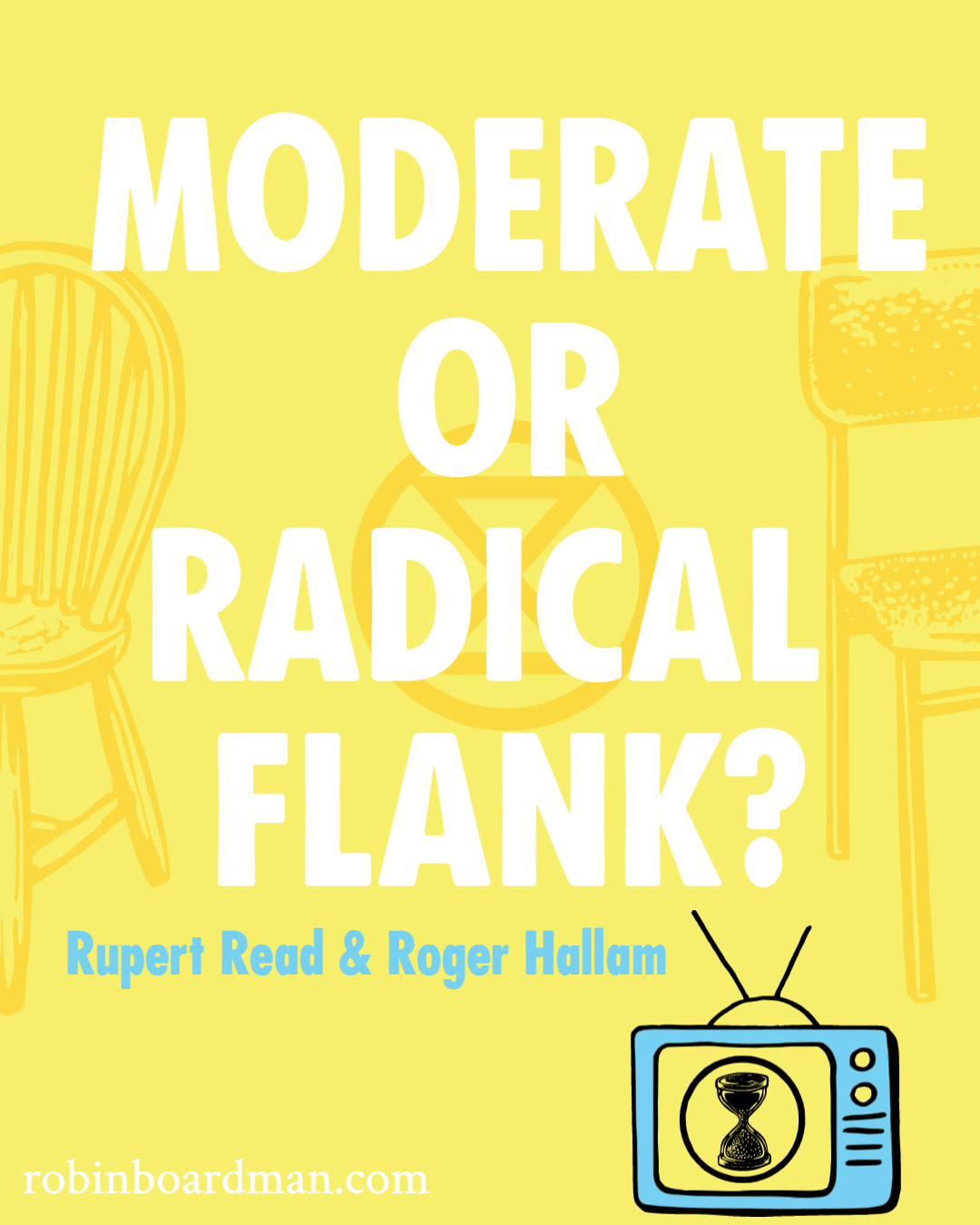
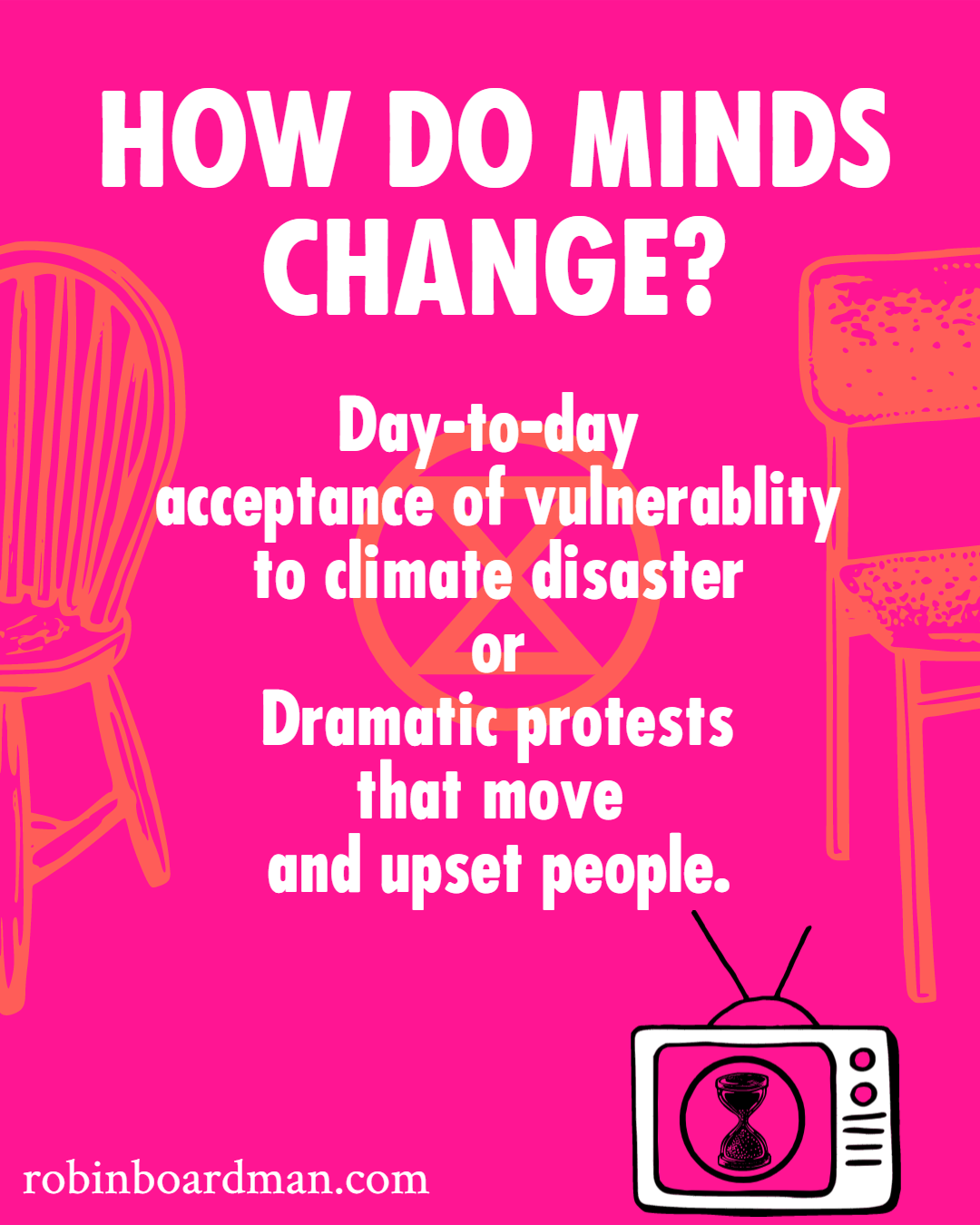
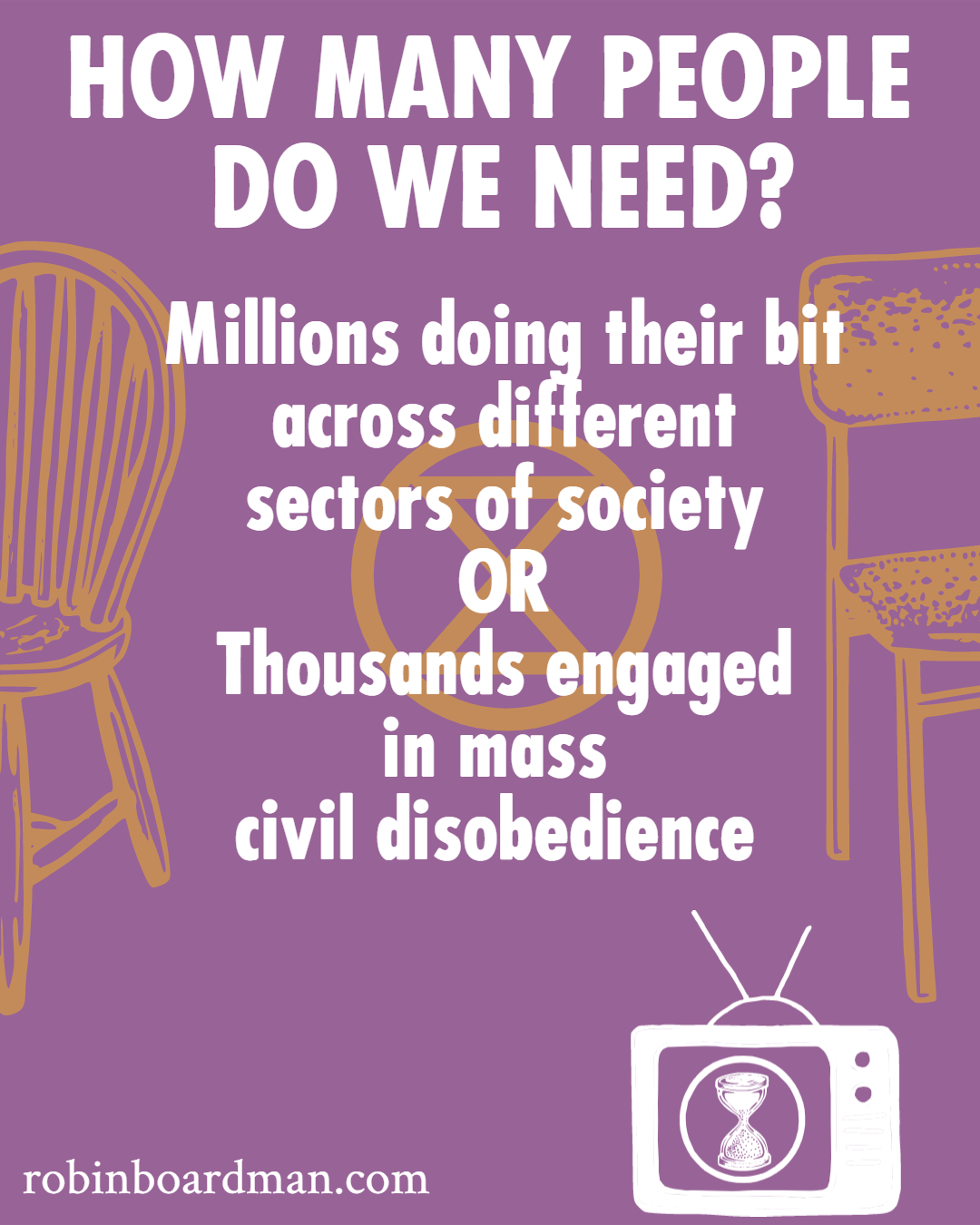
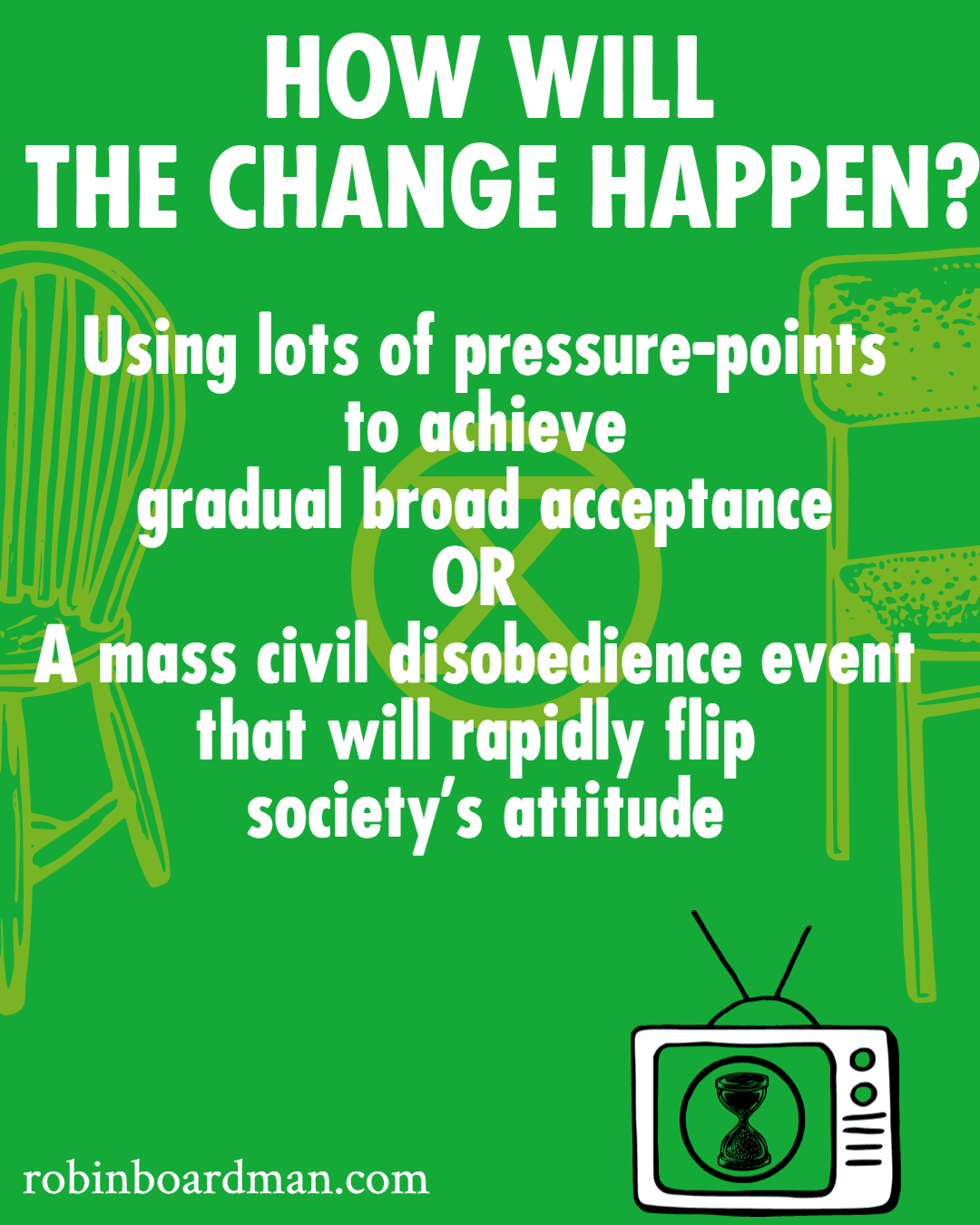
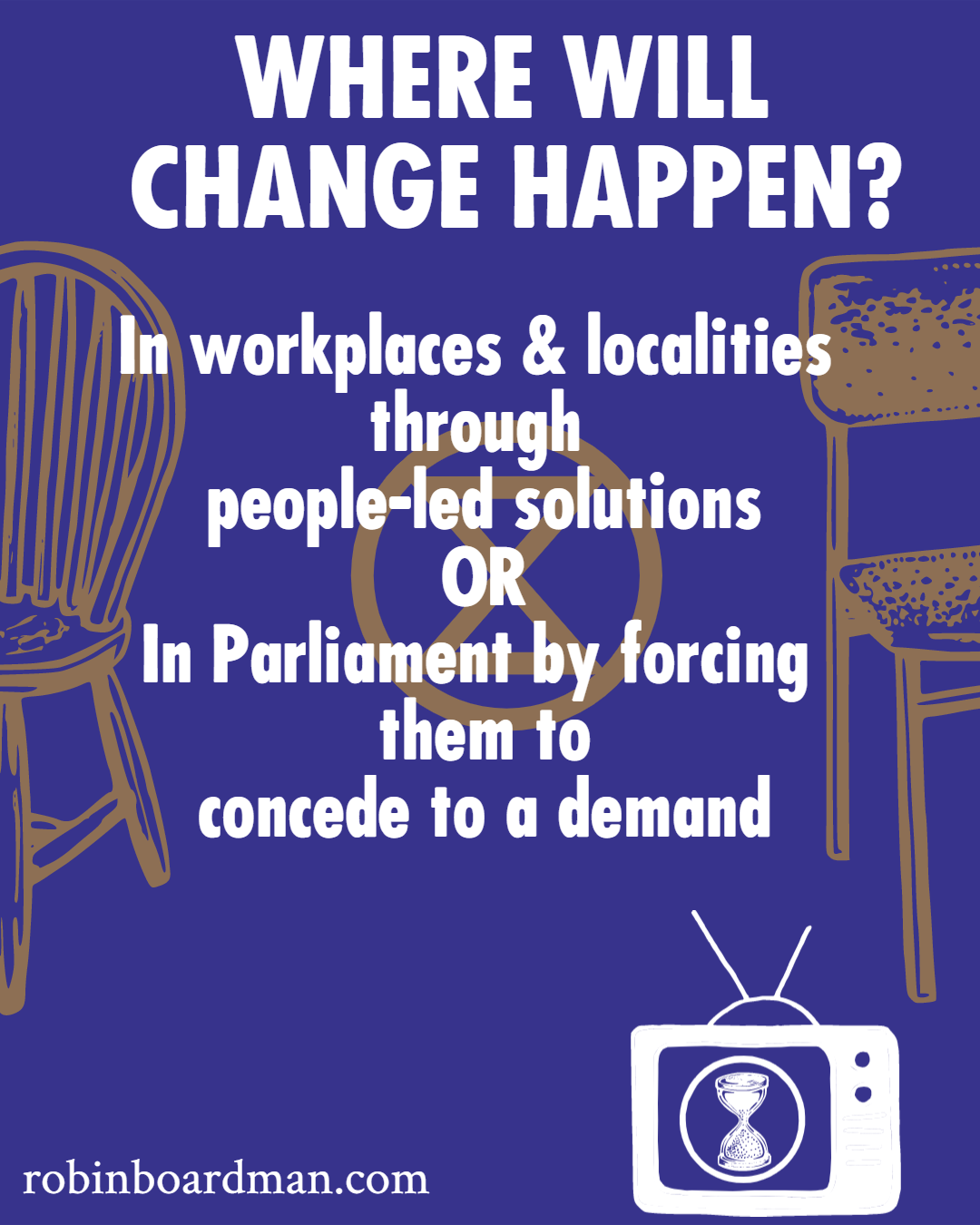
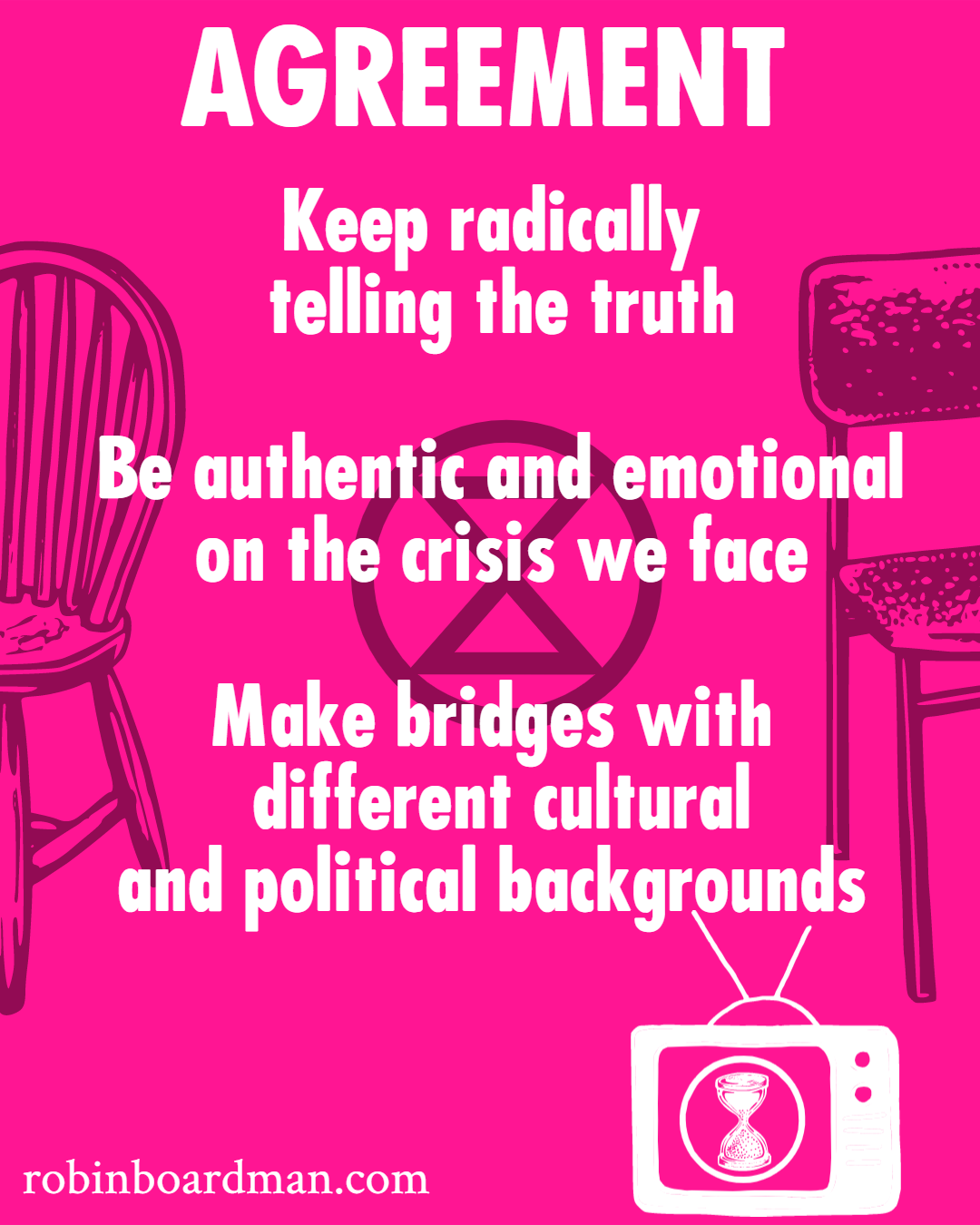
Transcript
Roger Hallam - Radical Flank (RH)
The Climate Movement is essentially different to all other previous social movements. It is based on a scientific fact. Therefore it is an objective emergency - there are no flanks, only what is necessary. An existential crisis is therefore not a political crisis because in a political debate people have their own different interests whereas in an existential crisis, we are all affected. There’s only one position to deal with it, not a variety.
In a similar vein, there is only one position on obscene acts such as rape and child abuse. They break human values and it's in their opposition that we can unite. For example, in WW2, very different groups such as conservative Catholics and Republican Socialists worked together under one position, resistance to Hitler. Unless you have a good excuse (responsibility, illness), you have a duty to disobey. You make a demand on the Government and then disrupt society. By speaking this truth, you maximize the potential of mobilization towards the radical flank/objective need.
Rupert Read - Moderate Flank (RR)
Agreed with analysis of an existential issue. The tragedy is that we have raised awareness through XR but the topic does not dominate everyday politics. We have not moved into emergency mode as society or in most hearts and minds. In WW2, there was a very different emergency because life could go back to normal afterwards. With climate we will be in constant emergency. The objective reality is that most people are not in that place yet in their thinking on climate. We need a profound understanding of our vulnerability to be able to comprehend radical action - e.g most people didn’t understand Insulate Britain. Why is it justified to block motorways? So further ongoing work is needed to bring home the understanding of our emerging shared vulnerability. This can be achieved by walking the talk of adaptation and resilience, especially in communities and workplaces.
The radical flank that is XR has opened the Overton Window (the space of acceptable political debate). There is an argument now therefore for a moderate flank that can successfully fill that space. This new, mass, distributed moderate flank [to XR] can seem and be more realistic and help to bring that wider understanding of the existential crisis to our society. We must accept that we won’t get overnight change that we are hoping for. It’s clear that XR’s 2025 net zero demand is uncredible now that it's 2022. There’s no chance of it happening with the current government.
We must challenge the idea of just going back to normal. Perhaps that is what lots of people who join the radical flank believe - that if they throw themselves at it, make sacrifices, then there could be a huge overnight change, we’ll win and we could all go back to normal. The moderate flank approach, on the other hand, is more realistic in understanding that now the clock is never going to go back before midnight. And in understanding that most people aren’t quite there yet, while the Government is nowhere near; and that we need to start making the changes ourselves, in lieu of sufficient Government action. In this way you could say that the moderate flank is even more radical than the radical flank because it is making the changes happen itself, such as creating Climate Emergency Centres, instead of asking power to concede a demand.
The Moderate flank accepts that we are already past a disaster point. There’s no fixing of the emergency. We must start to build a society that can deal with it for the long term. That takes mature wisdom and an acceptance of the death and loss we face. It accepts that we don’t have sufficient numbers yet and says that whilst resistance is certainly justified, it will continue to fail until a broader portion of society believes in the existential threat. The actions of the moderate flank will both protect against that threat and help bring a broader plurality to see clearly the threat.
RH
I believe that you are mixing up the psychological with the normative. I can happily concede that many people are not as keen on change as the radical flank. A normative analysis however says, “what should I do? What’s the best use of my time?” Strategically, the question is what is going to have the most effect? These are key questions we all ask ourselves in response to climate science.
RR
Yes and we need millions involved in it. Similar to the 3.5% of society figure that XR calls for. I would be astounded if XR can achieve that in future rebellions but I believe it's more realistic that a moderate flank could get millions involved and help to shift the public consciousness. XR has opened the space for this new flank.
RH
There is a difference between acting on what is necessary and trying to fit into the existing political system. Just because the world is like that, doesn’t mean we need to fit into it. Activists by definition have the agency to make change. They are not confined to the limits of the existing system. The more that we argue that we need to fit into an existing space, i.e as you say, where people are, the more the world will continue to stay as it is. It creates a self fulfilling prophecy. If we say “We have to accept the world as it is to create change”, then the world will just stay as it is.
How will political change happen? I believe that society is heading for collapse. Therefore reformism will not save it. We are now in a revolutionary period because the hegemonic power is taking us over the cliff. Capitalism, economic growth, individualism, lack of collective action - all of these features of society are destroying us. These are not going to change with reform in the face of collapse. Instead we need a revolutionary force in the form of civil resistance that can help make the drastic changes needed.
RR
Agreed that this civilization is finished. We are already off the cliff. Now we need to try and not fall so far and clamber our way back up.
So, do we have the numbers that are needed for your revolutionary force? You need a broad plurality of millions in support of it too. The radical flank should be just the tip of an iceberg. Below it should be a far bigger mass: the new mass moderate flank. (And below that needs to be a still larger cohort of millions of sympathisers - holding the top part of the iceberg up).
RH
I believe there are sufficient numbers to do effective civil resistance now. I have empirical evidence from doing 5 talks a week - at each talk, 2/3 people will agree to civil disobedience to the point of risking prison. We know that sufficient numbers can create huge changes, such as police reform in Minnesota after BLM protests or even the recent motorway protest in Serbia that won legislative change to stop the country being exploited by Transnational corporations for mining rights. So we know this is how political change works.
My proposition is that Just Stop Oil could get 2000 people involved in civil disobedience in Spring. So how do you bring the 70% of the public along? You create a moment of whirlwind action ( i.e a dramatic demonstration that creates a national debate) that will expose the weakness of the system and bring people in support of the movement against it. The usual political mechanisms such as alliances, coalitions, legal reform etc are all too slow and invested in the current paradigm. The danger is then that you invite people to join that and we risk not creating the critical mass we need for civil resistance.
RR
We need a balanced ecosystem of action and of groups. We can’t expect many lawyers etc to come out in civil resistance but we could rely on them for serious climatically-oriented legal reform.
Just Stop Oil sounds very encouraging - it has a clear and important aim. But thousands of people isn’t sufficient for the totality of the change we now need. The comparisons of past struggles that have done this e.g civil rights in the US, are insufficient because a crucial difference is that our crisis is bigger and more permanent and most people don’t fully understand that. There is a massive difference also in how easy it is for power to concede on our demands. With civil rights for example, accepting black people into society wasn’t going to majorly disrupt the existing elite or economic system. With climate however, the legislation we need is going to make a lot of existing corporations very unhappy. Therefore it is far more difficult for us than it was for MLK. So how do we bring about broad social change? Well if it needs a broad spectrum then it simply can’t just be top-down. This is why I disagree with “eco–leninists”, such as Andreas Malm, who have advocated for blowing up pipelines. It is completely implausible to impose the necessary changes. We must bring (nearly) everyone along with us. All action that sets the majority of the population against you, as in Insulate Britain, is fucked.
We need civil society to push on lots of fronts. For example, we now have Lawyers for Net Zero working on legal challenges. I’m not saying that we should return to the 1990s NGO model. Let’s galvanize the forces of XR to move beyond that and into further corners of society. This is what the moderate flank that I envision and that is starting to take shape and to emerge can/could do.
RH
Let’s concretise these ideas. This crisis is fundamentally different from the approaches you suggest. You are suggesting to use information and persuasion to bring people on board e.g lawyers. That might work well for simple actions such as doing the dishes but fails when it comes to challenging people’s sense of identity. Many of these groups are far too invested in society as it stands to be changed through reasoning. For instance with civil rights in the US, you couldn’t reason with many white people in the south on race. They believed it was their god given right to dominant black people. So, that's why the civil rights movements failed for 90 years.. Until they took radical action and challenged entrenched power, they would get nowhere. That is absolutely what we need to be doing.
In a similar vein, there is a broad section of entrenched power and society that believe that we have a right to destroy nature and continually produce. It is our cultural way of life. We know there are flaws to it but it is our way of life. When you engage in civil resistance you throw the dice on changing the population's mind on the topic through emotional action, not information. People will get angry, but like in family relationships, often we get angriest before conceding that the other person is right.
People say that Insulate Britain are just upsetting people. I believe that they are upsetting people but that that period of emotional turmoil will help people to realize they are right. Therefore the action needs to be nonviolent and it needs to be dialogical. It needs to talk about the commonality of humanity and find a way through. Respectful dialogue can bridge the divide that the strong emotions make. This is why nonviolent action is so powerful.
RR
Agreed that one was of the best aspects of XR but I didn’t see that as much in Insulate Britain. I’m very skeptical of the idea that IB helped move people to our position.
My theory of change is that we have to keep radically telling the truth, being authentic and emotional. We also need to get deeper into ourselves and our children’s vulnerability. “Climate disasters and food scarcity could kill my children” - We need this being said by a majority. We need to start these conversations in our workplaces and geographic areas. In workplaces for example, this can help lead to questions on challenging CO2 emissions from commuting etc and even challenge aims such as, “What are we doing with our profits?” Taking action on those relatable points in strong workplaces such as law, audit, insurance would be transformative.
RH
That is a good vision but I disagree with one point which is that I believe the change will be nonlinear. It will need to be a rapid transformation. The levels of change we need, even just to insulate Britain, are huge. We need massive amounts of training, labour and resources. We need revolutionary levels of change. Civil resistance can press through on this.
The end of civilization means that we need to challenge the neoliberal cult of individualism. It lies on so many fronts - people aren’t happier when they make more money or make decisions on their own. They are happier in loving relationships and stable communities. That’s not green propaganda, it's solid social science. A broad theory of change that means we need to create mass, united movements to challenge that idea. We can’t rely on the individuals, they aren’t the rational actors some believe. We are all influenced by so many aspects of our life, emotionally and economically. Our reality is over constructed on the individual. In Indigenous cultures and even just those before the 1980s, we really believed in society. If we can herd our current society to this belief, then we can transform rapidly. For instance in 1939, the British Public were very opposed to WW2. They weren’t being cowardly, they were just in a wishful thinking phase (like many people have when they dismiss the threat of Trump). Within 2 weeks of invading Czechoslovakia though, the whole society shifts.
RR
Will there be such a line for climate collapse? I totally agree with the failures of society. Many of us have believed that the lines in the sand such as Katrina and COP26 would be the turning point. They have passed and will continue to pass. Yes we will get an increase in numbers but there needs to be viable paths for those people to enter activism that appeals to a broader population, including conservative and non-woke people.
Workplace action isn’t individualistic - you are in a real community where you can exact action. From there you can shame the Government into action. Then you can impact what the business sectors lobby for - ultimately, cutting out climate bad actors.
Perhaps we get there through civil resistance. But I believe that lots of pressure points with small action will help trigger change. Then we can build towards a sudden flip through a General Climate Strike for example, but we need to build towards that. For example, legally you can’t currently strike on anything outside what directly affects you at the workplaces. The combination of lawyers' action and workplace criticisms can help us build a society where people can strike on climate change and then force the government's hand.
RH
There will be sudden changes - such as the fall of the Roman Empire. History is full of these episodes. Our cultural experience is the last 30 years, which is unique in European history for its lack of major conflicts or revolution. That won’t always be the case.
RR
John Michael Greer points out that collapses do take a long time. What is the line going to be? You’re expecting a flip but what is it going to be that will force it?
RH
The collapse can come quickly through social repression. In the same way we do emotionally. We can sit and tell people we are fine and then suddenly collapse into tears. Why? Because social repression has built up.
This isn’t consequential - it will happen all at once.
Let’s say there were 10 million conversations about Insulate Britain with 90% of them negative. Those animated negative conversations are signals that people will flip their opinions soon. It's a gut instinctual negative reaction, similar to getting angry at your parents, then you will later reflect on and change your mind - knowing that the argument behind it is the truth.
RR
I disagree, how can you believe that a 90% disagreement will lead to broad support for the cause? The iceberg will sink, without more support…
For example, XR flourished with the April Rebellion but was mortally wounded by Canning Town. Perhaps people will come to XR from climate disasters. Can you turn Canning Town into a positive?
Isn’t there a danger that your approach is unfalsifiable? However bad the public reaction, you take that as evidence that your method is working! You say that if people are pissed off by something, then you are making psychological progress. I am worried that this immunises you to criticism and makes it impossible for the movement to learn from mistakes.
RH
Yes there is the danger you point to. It’s difficult to counter with a rational argument and empirics. I work with empirics everyday through mobilisation but I have a fundamental difference in strategic approach. I can’t prove what's happening in peoples heads.
BLM started in 2012 and was small. Social repression built up and then the line was crossed with George Floyd killing. Then there was an emotional breakdown which won the legislature change.
RR
Agreed that is a hope we have for XR but going back to my point, aren’t you saying that any publicity, even bad, is good publicity? I think there are serious flaws to that. Most publicity is good publicity (including some that at first appears negative), but not all.
RH
No I’m not saying that; I think that disruption is problematic and you don’t know how it will affect people. You have to take a gamble. The chances will go down the more you start abusing people verbally or moving towards violence. We don’t want that emotional outrage to pour into civil war or terrorism.
It’s not a guarantee but it has a higher probability of creating rapid change, i.e in next 3-5 years as Sir Davdi King has asked for.
We agree that there will be a moderate flank but that doesn’t mean we need to advocate for it. We need to advocate for civil resistance as a duty. If you’re not doing it, then go ahead and create other organizations. New organizations with emotional intelligence, not just 1950s male rational corporations, and with small scale direct action.
Civil resistance will still need allies at the times of whirlwinds.
RR
I’m glad that we can move closer together in agreeing that both sides are necessary. Just StopOil is necessary. I say to anyone: if you are in a position where you believe you can criticize them, then you need to be able to argue that what you are doing is better. When they take action, I will say so and I will advocate for what people can be doing in the moderate flank.
When I work with big old NGO organizations, I try to take the leaders and people out of their comfort zones but only in ways that I believe are strategically valid. Together we can build this ecosystem of organizations towards change.
RH
Yes as long as you go to the moderate flank and keep challenging it to step up. It's not a pleasant process but welcome to real life. It's difficult!
PART 2: Inclusivity
RR
We need to start talking to people beyond our politics. How can we create more ground for conservatives, anti-woke etc?
RH
The narrative in left wing circles is that you need to politicize things and create social conflict. That’s half right - yes there are bad people doing bad things that need to be challenged. At the same time, the reality of the situation is that this isn't a question of interest, it's a question of human survival. It's a sense, not an absolutist reality. There's both common humanity (existential) and there's social injustice (political). There are different cultural orientations to consider when appealing to common humanity - better to phrase it that way rather than get reduced to a certain identity such as consverative. Most people only think about politics 5 mins a week. They have other cultural, social and spiritual commitments on their minds. We all have internal conflicts in our human psyche, more than the reductive analysis of “us vs them”, would have you believe. For example, a Conservative MP just flipped to Labour over the parties during the pandemic. We can’t believe people are totally set in their orientations.
The fear of death is a huge part of our culture. When you talk and listen to cultural conservatives, you can start to challenge the contradictions on a human level and crucially do it in their own frame. You are a consverative so don’t you want to conserve society rather than let it go to the dogs?
There are big structural contradictions in left wing thought- e.g between freedom and equality. In Conservativism, there are also structural contradictions - they believe in capitalism but it is also destroying family values and community. This is the strategy. Highlight the contradictions.
RR
Agreed. On the Right we could say that we need to challenge the conversative dogma of “free market”, given that it degrades our world, and on the Left we need to challenge the dogma of “progress”. Progress is tied in usually with economic growth. It has led to absurd ideas such as Fully Automated Luxury Communism, ideas which are ecologically destructive. Climate breakdown totally changes the ideals of both. On one side, the ideals of freedom, making money and getting your own way, and on the other of mass production and state intervention to improve equality. Both are nice ideas potentially, but climate breakdown totally changes the picture. Our current politics are made of residual elites that still believe only those old ideals.
WW2 has a great precedent here with both Popular Fronts and a National government. The winning response combined elements of the left and the right. If we can appeal to people on what is necessary, we can speak to their values rather than get caught in political ideology.
RH
What we face is total transformation - we can either get it through democracy or we wait until facism seizes the reins. The flip point is when you say “by pursuing capitalism, you are going to destroy it”. WW2 citizens agreed to socialist perspectives because of the war, not because they were socialists.
RR
Roosevelt went to US Car manufacturers and laid out the plans for tank building after Pearl Harbour. They turned to him in amazement. “But this means no cars?!” - Yep. Fundamental transformation.
RH
Yes and the critical point is that they have to do that now or they will never produce cars again. It's existential. This is the point we can challenge Tory MPS on. The quicker we race to capitalism, the quicker we destroy and reduce our liberties because mass production and profit orientation is destroying the world.
RR
We disagree on timescales and I think we are unlikely to see conservatives in a civil resistance movement soon. We agree though that we can’t be dogmatic against different political viewpoints.
RH
Yes - if you’re not in dialogue then you create polarization. You need to talk to people. People are more tribal than political. Rightwing ideology might set their beliefs but through dialogue you can evolve a discussion around their frames. Then you can shake hands.
RR
We need this civic culture - this is really it and an emergency must trump what seems important to you and help you realize what is actually most important to you.
It creates a mutual respect for fearless conversation with the other side so that we see each other as human. Ben Goldsmith is in the Conservative Environment Network - we don’t help him if we say Conservatives are wankers. We do help him if we connect on a human level. As you said, at the same time, we are all in this together (existentially) and we’re not all in this together (inequality.).
RH
It's not the moderate green conservatives that will make the difference. They are still neoliberal liberals. They are totally stuck in green growth. We need to be smart in thinking which are the different actors in conservatism. There are other groups such as 1 nation conservatives. They are about heritage, nation and patriotism. They are the key flip group because they are intelligent enough to know that capitalism is not God. They know, as Adam Smith said, you can’t let the merchant class take over the State. It's no good at ruling because it fundamentally believes in private interest. We’re going to destroy Britain - destroy trading, destroy coastal areas and 20% of housing in London. That's not a 1 nation conservative orientation. They are old fashion realists. A really important alliance is going to involve patriotic conservatives who are skeptical of capitalism.
RR
Interesting. I think it's both Green growth conservatives and 1 Nation patriots we need. I have debated this with Roger Scruton [available at https://www.lse.ac.uk/lse-player?id=1922 ] - conversative green philosopher - and there are elements in his thought that help us. For instance, focusing on continuing the way of life that we have.
RH
Right now we are in a straight jacket of the left and right in politics. It used to be a competition between church and state. Now we have left and right. We need to create new fractures in the 21st century. For example, Ecological realism and neoliberal fantasy. The left wing space is full of anti-nature imperialistic arrogance - “We can shit on it and we don't care.”
Conclusion - How will the future see us?
I listened to a recent lecture by Carmody Grey. She’s a Catholic theologian and she describes that in that tradition, the problem isn’t nature. A dominant idea in ecological spaces is that to save nature, we need to join and make peace with nature. But really, nature will be fine for millions for years. What we need to ask ourselves is what we want to sustain? It’s our humanity. That realisation gives us an amazing opportunity to no longer hate ourselves but transform ourselves to save the world. There is a dark side to living - we hate ourselves, we kill etc. And understandably so because we are thrown into a world with choice and then we have to deal with our internal instincts and passions and external strategy. We have to learn how to manage and deal with them.
This tradition gives us a break - it's actually okay, let's love ourselves more.
RR
People in the future will have different values so it's hard to know how history will judge us. The Pope wrote brilliantly on spiritual thinking and environmentalism too. David Graeber's last book is a hymn to human agency and optimism of the will. This is the spirit I believe we should take.
RH
A pathway to wisdom is suffering. Despair, depression are always labeled simplistically bad. But they are pathways to destruction of the ego. People who have hard lives are often wise because they have lived the extremes in themselves and in the world. That provides the potentiality for a psychological change. For me and others, it has meant a shift to a service mentality. I’m not out to succeed but to be in service for common good. That's the miracle of human purpose. This is why we need to revisit theological positions so we can rediscover the intensity of what it means to be human rather than superficial, consumerist bollocks of the last 30 years. It's not all about saving the world and it's all about who we want to be.
RR
And here we are now modeling what we want in humanity - we fundamentally disagree and we can sit down and talk about it.
To sign up for the Radical Flank (Just Stop Oil) click here.
For more on the Moderate Flank, follow Rupert on Twitter.
If you enjoyed this summary, please do subscribe to my newsletter for more digested versions of books and debates on civil disobedience and the climate crisis. For more from Rupert and Roger, check out their books below.
Disclosure: If you buy books linked on my site, I may earn a commission for coffee money from Bookshop.org, whose fees support independent bookshops 📚☕